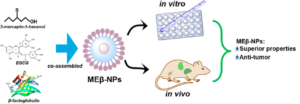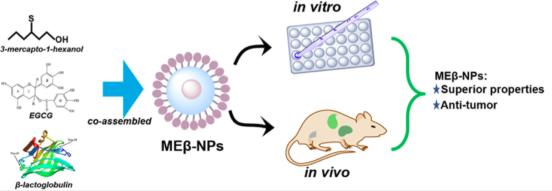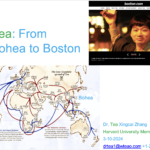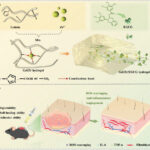Recently, Yuanyuan Yang, Peng Jin, Dr. Xingcai Zhang, and Prof. Qizhen Du etc published an international peer review research paper on the study of the Antitumor Activity of Tea Polyphenol Epigallocatechin Gallate (EGCG) Nanocomplexes (New Epigallocatechin Gallate (EGCG) Nanocomplexes Co-Assembled with 3-Mercapto-1-Hexanol
and  -Lactoglobulin for Improvement of Antitumor Activity. J. Biomed. Nanotechnol. 13, 805–814 (2017)). Below is a brief introduction of the interesting research paper.
-Lactoglobulin for Improvement of Antitumor Activity. J. Biomed. Nanotechnol. 13, 805–814 (2017)). Below is a brief introduction of the interesting research paper.
“Historically, herbal medicine has formed the basis of folk remedies for various ailments. Research on biological activities of herbal functional components has become especially attractive in recent years. Green tea (Camellia sinensis ) is one of the most widely consumed beverages and has well-known health benefits against multiple conditions including oxidative stress,1 atherosclerosis, cancer,2 cardiovascular disease3 and other medical needs. These healing properties are attributable to its abundant polyphenolic catechins. These include epigallocatechin-3-gallate (EGCG), a major polyphenolic component of green tea, with anti-proliferative and chemopreventive effects in several cancers and cardiovascular diseases.4 5 EGCG was also reported to have powerful antioxidant, antibacterial, anti-inflammatory, anti-tumor and anti-atherosclerosis effects,6 and potential therapeutic value for various nervous system diseases.7 Because, it selectively inhibited tumor cells and induced apoptosis without damaging normal cells,8 and more promising than other anti-cancer drugs.9

(-)-Epigallocatechin-3-gallate (EGCG), as the major catechin in green tea, is a potent antioxidant with numerous reported health benefits such as anti-proliferative and pro-apoptotic effects. Nanovehicles for EGCG delivery can effectively improve its antioxidant capacity, absorbability and bioavailability in vivo. We used thermally modified -lactoglobulin (-Lg), 3-mercapto-1-hexanol (3MH) and EGCG to form stable co-assembled nanocomplexes (ME-NPs) with greater stability, sustained release and anticancer effects in vitro and in vivo than free EGCG. ME-NPs inhibited A375, Hep G2 and TE-1 tumor cell proliferation with 65.90%, 60.44% and 32.88% greater activity, respectively, than EGCG. ME-NPs with100 mg EGCG/kg (3MH/EGCG/-LG = 4:32:1) were not toxic to mice and inhibited implanted human melanoma A375 cell tumor growth by 57.78%, twice as effective as EGCG alone. Thus, ME-NPs have greater stability and anti tumor activity than EGCG, with potential value for anticancer therapy.”
See also:
Polyphenol and Self-Assembly: Metal Polyphenol Nanonetwork for Drug Delivery and Pharmaceutical Applications by Dr. Tea (Xingcai Zhang) etc https://doi.org/10.4155/fdd-2019-0001
Effect of Fermentation and Plucking Standards on the Quality of Tea Juice, by Dr.Yong-Quan Xu, Dr. Xingcai Zhang, and Dr. Jun-Feng Yin etc. https://doi.org/10.1155/2018/4312875
Antitumor Activity of Tea Polyphenol Epigallocatechin Gallate (EGCG) Nanocomplexes (New Epigallocatechin Gallate (EGCG) Nanocomplexes Co-Assembled with 3-Mercapto-1-Hexanol
and Lactoglobulin for Improvement of Antitumor Activity. J. Biomed. Nanotechnol. 13, 805–814 (2017) by Dr. Xingcai Zhang, and Dr. Qizhen Du etc https://doi.org/10.1166/jbn.2017.2400 http://wteao.org/antitumor-activity-of-tea-polyphenol-egcg/
Tea and Cancer Prevention. J. Cancer Res. Updates 4 (2), 65-73. by Dr. Xingcai Zhang.DOI: http://dx.doi.org/10.6000/1929-2279.2015.04.02.4
SMRT sequencing yields the chromosome-scale reference genome of tea tree, Camellia sinensis var. sinensis by Dr. Xingcai Zhang, Dr. Lizhi Gao etc doi: https://doi.org/10.1101/2020.01.02.892430
The tea tree genome provides insights into tea flavor and independent evolution of caffeine biosynthesis. Molecular Plant, 2017 Dr. Lizhi Gao etc
For more information about World Tea Organization and collaborations, please feel free to contact WTeaO.org [email protected] or http://wteao.org/contact/.





Comments by wteao
Prof. Shen Dongmei`s New Book on Tea
Rajiv Rochan---“ambassador of tea” of India in China, India Director ...